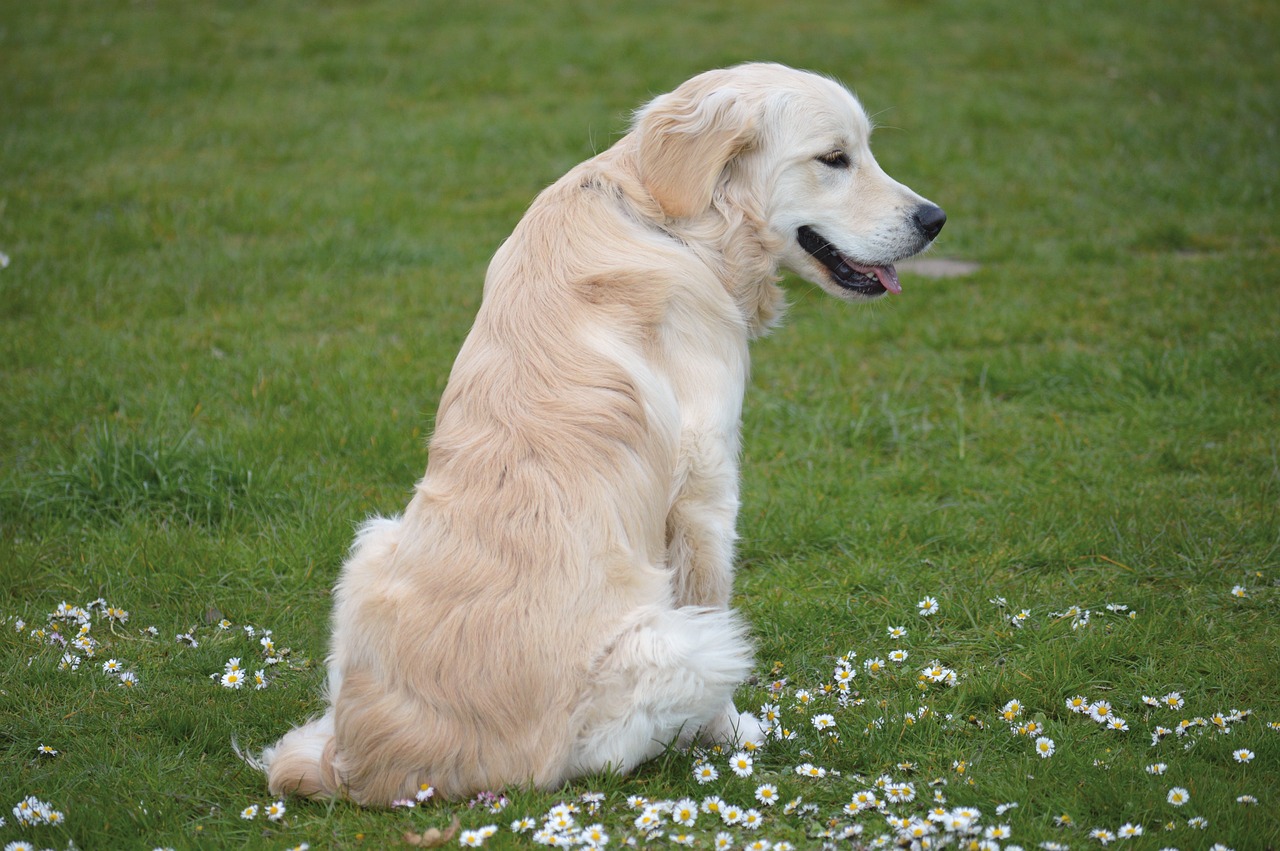When people ask me for the ideal family dog, a Golden Retriever would immediately come to mind. Those bright smiles, wagging tails, and happy-go-lucky demeanor seem to be the polar opposite of aggression. Yet, as someone who has worked with countless pets over the years, I understand your concern if you have ever wondered, “Are Golden Retrievers aggressive?”
Are Golden Retrievers Aggressive? A Look At Their Natural Temperament

In general, no, Golden Retrievers are not aggressive. Scientific studies and behavioral assessments consistently place these furry companions among the least aggressive breeds. According to the American Temperament Test Society, they boast an impressive 85.6% pass rate in temperament testing, significantly higher than many other breeds.
To understand their genetic predisposition for gentleness, we should trace back to Golden’s breeding history. These dogs were first bred in 1868 as working retrievers who could handle game birds with exceptional care. Today, Golden Retrievers still retain their innate gentle traits, making them ideal therapy dogs, service animals, and family companions.
Scientists have actually found specific genes that make dogs friendly and calm— and guess what? Golden Retrievers hit the jackpot in that department! So when people tell you Goldies are naturally sweet-natured, they are not just sharing cute stories. It’s literally in their genes, thanks to generations of breeders carefully selecting the friendliest dogs to create the loving companions we all love.
What Circumstances May Provoke Aggression?
While aggressive behaviors seem at odds with Golden Retrievers’ characteristics, no dog breed is 100% immune to aggression. Though rare, provocative actions can be triggered in some circumstances. Pinpointing the root cause is the first step in dealing with and preventing them:
Poor Breeding Practices
The surge in Golden Retriever popularity has unfortunately led to irresponsible breeding practices. Backyard breeders focusing solely on appearance while neglecting temperament can produce puppies with unstable personalities.
Reputable studies show that offspring from poorly bred lines may exhibit higher rates of anxiety and aggression compared to those from ethical breeders who prioritize temperament testing.
Social Development Gaps
Studies in canine behavior demonstrate that puppies who miss critical socialization milestones between 3-16 weeks may develop behavioral issues later in life. Research indicates that Golden Retrievers who lack diverse social experiences during this window are more likely to exhibit fear-based responses, potentially leading to defensive aggression when encountering novel situations.
Medical Conditions

Neurological issues, thyroid disorders, and chronic pain conditions can negatively affect a dog’s temperament. Recent veterinary studies have shown that up to 40% of unexplained aggressive behaviors in previously gentle dogs can be traced to underlying health issues. This emphasizes the importance of regular health screenings in maintaining stable behavior.
Environmental Stress
Contemporary research highlights how environmental factors impact canine behavior. Golden Retrievers living in high-stress environments or experiencing significant life changes may exhibit temporary aggressive tendencies as a coping mechanism. This reaction often surfaces during household transitions, such as moving homes or introducing new family members.
Training Inconsistencies
Behavioral studies indicate that inconsistent training methods can create confusion and anxiety in Golden Retrievers. Dogs receiving mixed signals about acceptable behavior may develop stress-related aggression as they struggle to understand expectations and boundaries in their environment.
Territorial Behavior
While uncommon, some Golden Retrievers may display territorial aggression, particularly during adolescence. Statistics show this behavior is more prevalent in intact males and typically emerges between 18-24 months of age. Professional intervention at this stage often produces successful behavioral modification.
Past Trauma
Research demonstrates that Golden Retrievers who have experienced traumatic events may develop defensive behaviors. These responses can manifest as aggression when similar triggers are encountered, highlighting the importance of understanding a rescue dog’s history and providing appropriate rehabilitation support.
Signs of Aggression to Watch For
- Body Language Changes: Watch for subtle shifts in posture, including stiffening of the body, raised hackles, and a high-held tail. These physical changes often precede aggressive displays.
- Vocal Warnings: Observe different types of growls, barks, and whines. A low, rumbling growl differs significantly from playful vocalizations and requires immediate attention.
- Territorial Marking: Note any unusual marking behaviors, especially in new locations or inside the house. This can indicate rising tension and territorial aggression.
- Changes in Routine Behavior: Monitor disruptions in eating, sleeping, or play patterns. Significant changes often signal underlying stress that could lead to aggressive responses.
- Fixed Staring: Be aware of prolonged, intense eye contact, particularly when accompanied by a stiff posture. This combination often indicates escalating tension.
Prevention and Management of Golden Retriever Aggression

Prevention Strategies
- Early Socialization: Expose puppies to various people, animals, and environments between 3-16 weeks of age. This critical period shapes their future responses to new situations.
- Positive Training Methods: Implement proper training techniques for Golden Retrievers, especially reward-based methods, consistently. This builds confidence and creates clear communication channels between dog and owner.
- Make Sure Your Dog Stays Healthy: Feed your dog a high-quality food for Golden Retrievers to prevent health issues. Also, schedule routine veterinary visits to catch potential health issues early. Many aggressive behaviors stem from underlying medical conditions.
- Exercise Program: Maintain a structured physical activity routine combining walks, play, and mental stimulation. A well-exercised Golden is less likely to develop problematic behaviors.
- Consistent Boundaries: Establish clear household rules that all family members enforce. Consistency helps dogs understand expectations and reduces anxiety-related behaviors.
Management Techniques
- Trigger Identification: Document situations that cause stress or aggressive responses. Understanding triggers is the first step in developing an effective management plan.
- Safe Spaces: Create designated quiet areas where your dog can retreat when feeling overwhelmed. This gives them control over their stress levels.
- Routine Maintenance: Establish and stick to regular feeding, exercise, and rest schedules. Predictable routines help reduce anxiety and stress-related behaviors.
- Professional Support: Work with certified trainers or behaviorists at the first sign of concerning behavior. Early intervention leads to better outcomes.
- Environmental Management: Modify the home environment to reduce stress and prevent triggering situations. This might include baby gates, secure fencing, or quiet spaces.
Conclusion
Scientific evidence overwhelmingly supports the natural gentle disposition of Golden Retrievers, while acknowledging that environmental, medical, and genetic factors can influence their behavior. Through understanding the latest research in canine behavior and implementing evidence-based prevention and management strategies, owners can effectively maintain their Golden Retriever’s inherently friendly nature. While aggression can occur in any breed, Golden Retrievers remain one of the most reliable and gentle dog breeds when provided with appropriate care, training, and understanding. Remember that professional guidance early in your dog’s life creates the strongest foundation for a lifetime of positive behavior.

As a professional writer who specializes in canine care, I have spent a significant amount of time researching and writing about Golden Retrievers. While I do not own a Golden Retriever, my considerable research and collaboration with doctors, breeders, and Golden Retriever experts has provided me with a lot of information about this incredible breed. My writing covers a wide range of topics, from food and health concerns to behavior and training, to assist owners in raising well-rounded, healthy golden retrievers. Through this website, I wish to share my knowledge and positively touch the lives of both dogs and their humans.

